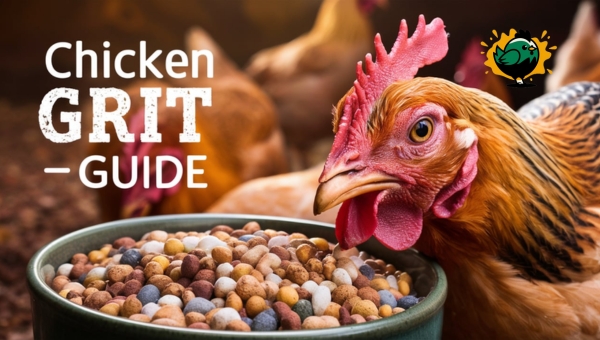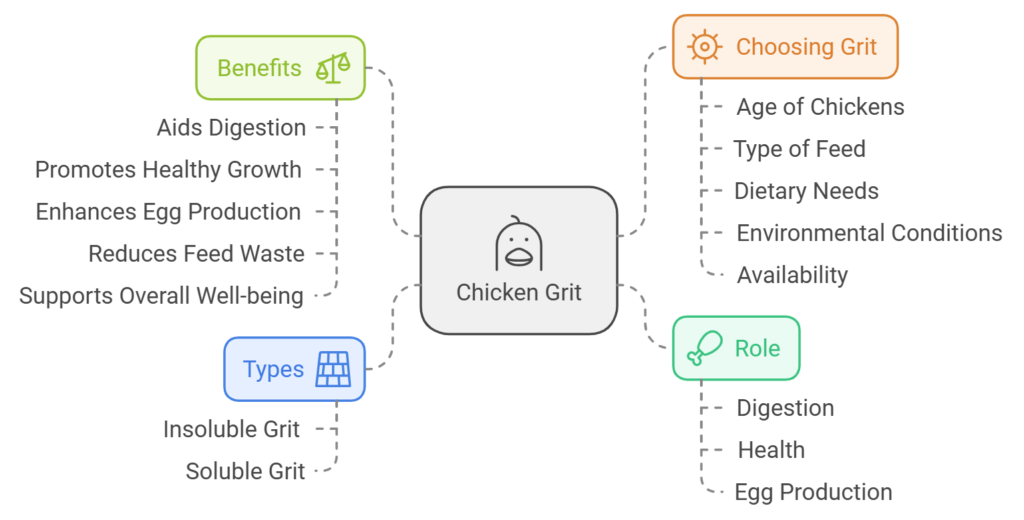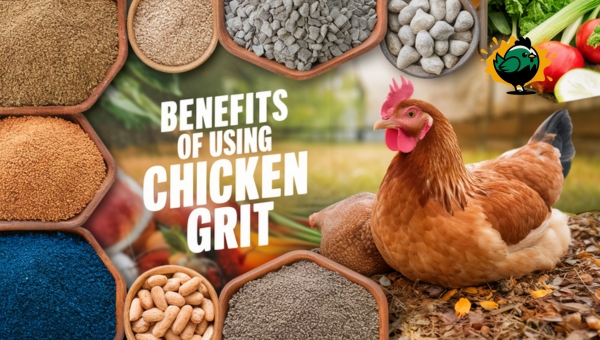Chicken Grit Guide | Boost Your Flock’s Health

Have you ever watched a chicken peck at the ground and wondered what it’s up to? It’s fascinating to think that something as simple as pebbles can play a crucial role in a chicken’s life. Chicken grit is more than just tiny stones; it’s a key player in their digestive process.
Imagine the journey of a chicken’s meal, starting from the beak and ending in a healthy egg. By helping to grind down food in their gizzards, chicken grit ensures your flock gets the nutrients they need. Let’s explore the types, benefits, and how to choose the right grit for your chickens.

Understanding The Role Of Chicken Grit
Chicken grit is a crucial component in the digestive health of poultry. It plays a vital role in:
- Digestion: Chickens lack teeth, so grit aids in grinding down food in their gizzards, a part of their digestive system. This ensures the food is broken down effectively for nutrient absorption.
- Health: Proper digestion with the help of grit can lead to healthier chickens, as they can utilize the nutrients from their feed more efficiently.
- Egg Production: For laying hens, grit can improve calcium absorption, leading to stronger eggshells.
- Types: There are two main types of chicken grit: insoluble and soluble. Each type serves a different purpose, making it essential to understand their roles.
Understanding these aspects ensures chickens have a balanced diet and optimal health.
Types Of Chicken Grit
Chicken grit plays a vital role in the health and digestion of poultry. It comes in two primary forms: insoluble and soluble. Each type of grit serves a distinct purpose in the dietary needs of chickens. Let’s explore these types to understand their roles and benefits.
Insoluble Grit
- Characteristics: Insoluble grit consists of small, hard stones such as granite.
- Function: It aids in grinding down food in the chicken’s gizzard.
- Benefits: By enhancing digestion, insoluble grit helps chickens break down food more efficiently, leading to better nutrient absorption.
Soluble Grit
- Composition: Soluble grit is primarily made up of oyster shells or limestone.
- Role: Provides essential calcium, crucial for laying hens.
- Benefits: Supports strong eggshell production, contributing to overall poultry health.
Also Read: Flaxseed for Chickens | Boost Health and Egg Quality
Benefits Of Using Chicken Grit
Chicken grit plays an essential role in maintaining the overall health and well-being of poultry. It aids in digestion by helping chickens grind down their food, which is crucial for proper nutrient absorption.

- Aids Digestion: Chicken grit is crucial for poultry digestion as it helps grind down food in the gizzard, ensuring efficient nutrient absorption.
- Promotes Healthy Growth: By enhancing digestion, chicken grit supports the overall growth and health of chickens, leading to stronger and more productive birds.
- Enhances Egg Production: With the right type of grit, chickens receive the necessary minerals, especially calcium, which is vital for producing strong eggshells.
- Reduces Feed Waste: With improved digestion, chickens can make the most of their feed, reducing waste and promoting a cost-effective feeding strategy.
- Supports Overall Well-being: Regular use of chicken grit contributes to the general health and vitality of the flock, ensuring active and thriving chickens.
How To Choose The Right Chicken Grit?
Selecting the right chicken grit is vital for the health and well-being of your flock. Here are key factors to consider:
- Age of Chickens: Younger chickens require finer grit compared to adult chickens. Ensure the grit size matches their developmental stage.
- Type of Feed: If you’re feeding whole grains, insoluble grit is essential to aid digestion. For layer hens, soluble grit is crucial for calcium intake.
- Dietary Needs: Consider the nutritional needs of your chickens. Soluble grit is beneficial for egg-laying hens, providing the necessary calcium.
- Environmental Conditions: If chickens are primarily indoors, they may need more grit compared to free-range chickens, who naturally find grit outside.
- Availability: Ensure that the chosen grit is readily accessible and cost-effective for your farming needs.
Conclusion
Chicken grit plays a vital role in the overall health and digestion of chickens. By understanding the types and benefits of chicken grit, poultry keepers can ensure their flocks receive the necessary nutrients for optimal health. Insoluble grit assists in grinding food, while soluble grit provides essential calcium.
Choosing the right type of grit depends on the age and needs of the chickens. Regularly providing the appropriate grit type supports healthy digestion and strong eggshells. In essence, incorporating chicken grit into a chicken’s diet is a simple yet effective way to promote a thriving flock. Explore more insightful articles on our site to enhance your poultry-keeping knowledge!
